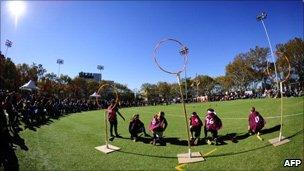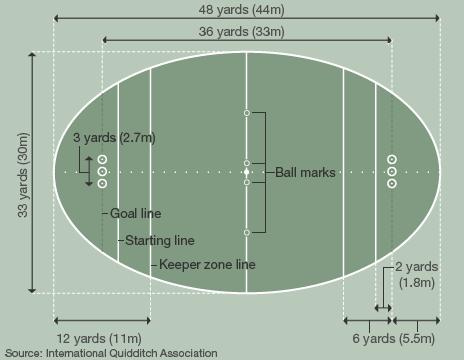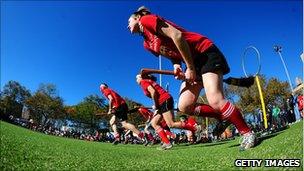Harry Potter: Quidditch for Muggles
- Published
Quidditch players explain the game
Quidditch, the game popularised in the Harry Potter books, is now being played by students around the world. So just how do you turn a magical sport into something that can be played in real life?
As a group of college students gather on a cold Sunday morning outside the White House for their weekly sports practice, it's hard not to smirk.
Watching adults run around the field with household brooms and mops between their legs, wearing makeshift wizards' capes, is quite a sight, after all. But in non-wizarding society (or the muggle world, for those of you in the know), one has to improvise.
"A Quidditch game might look crazy to somebody who's never seen it before," says Mariah Hegelson, treasurer of the George Washington University team, in Washington DC.
"But to an external observer watching a basketball game for the first time, that might look crazy too," she says, without a hint of irony.
For those who have managed to escape all things Harry Potter, Quidditch is the fictional sport popularised in JK Rowling's best-selling books.

The fourth annual Quidditch World Cup was held in New York in November
Quidditch is to wizards what football is to humans. In the books, Harry Potter and his friends play the sport at school. There is also a professional league, and even a Quidditch world cup.
It was only to be expected that children brought up on the books - the first was published way back in 1997 - would want to play it in real life.
The first key step towards creating a muggle version of the game was taken by Xander Manshel, a student at Middlebury college in the US state of Vermont, in 2005. Along with his friend Alex Benepe, he rounded up a group of students prepared to give it a try, sticking as closely as possible to the game played by Harry Potter.
Gravity
This includes the broomsticks.
"We all wish we could fly, we just have to deal with the realities of gravity," says Mariah Hegelson.
"Our generation grew up reading it, so playing Quidditch has sort of been a dream. People hold the books dearly in their hearts, so are happy to make it real."
The rules of the human game are similar to those followed in the wizarding world.

There are seven players on each team, including:
Three chasers, who score by throwing a ball known as the quaffle through one of three goals - hula hoops on sticks
Two beaters, who throw balls known as bludgers at the opposing team, in an attempt to stop them scoring
A keeper, who guards the goals
A seeker, whose job is to catch the prized golden snitch - an action which ends the game
In the fictional game, the snitch is a small magical ball with wings. It is very small and very fast, and very hard to catch.
Human snitch
Step forward Miles Millican, who - for this George Washington University training session - makes up for the fact that a real-life snitch does not have wings.
He is dressed in bright yellow, and his mission is to race around the field at high speed, the snitch dangling from his back.
"Not having magic, we use a ball in a sock," explains Miles. "I run around making sure it doesn't get caught, while seekers run around making sure it does."
Snaring the snitch is important. It not only wins your team 30 points (whittled down from 150 in the books), it also ends the game.
In the books, it is the Ministry of Magic which determines the rules. As there is no government agency that bears this responsibility in the muggle world, it is left to the International Quidditch Association (IQA). It has published a hefty rulebook for high schools and colleges, external, written by Alex Benepe, the IQA's president.
"Quidditch requires a lot of strategy. It's a cross between rugby, dodgeball, tag and basketball - but with brooms," he explains.
Since the inaugural game at Middlebury College in 2005, it has acquired a worldwide following.
The IQA has been contacted by players of the game as far afield as Japan, South Africa, Australia, Canada, Colombia and Finland.
Mr Benepe estimates it is played at more than 1,200 schools and colleges worldwide, with at least 200-300 active teams.
Quidditch's appeal is universal, he says.
Olympic goal
"Everybody plays it. We've had people from all walks of life, not just Harry Potter fans," he says.
"We get chess fanatics who've never played a sport before, alongside varsity soccer players."
One blogger has described Quidditch as a sport that threatens "to cause a rip in the very fabric of the nerd-jock continuum".

Quidditch is said to appeal to "nerds" and "jocks" alike - and all those in between
There have been calls for the game to be recognised by the NCAA - the National Collegiate Athletic Association - and given the same status as other college sports such as basketball and football.
But the IQA isn't itself pushing for such a change. For Alex Benepe, the essence of Quidditch is light-hearted.
"The brooms maintain the sport's tongue-in-cheek atmosphere," he says.
"At the end of the day, Quidditch is really a game and I think that a lot of NCAA sports people are very serious about their sport, and that's their life."
Nonetheless, he has big ambitions.
The IQA hosted the fourth Quidditch World Cup in New York in November 2010, with teams from across the United States, including Harvard and Yale, taking part.
But Mr Benepe is already looking beyond the World Cup - he wants to host a Quidditch exhibition match at the 2012 Olympics.
It might seem like a ridiculous idea, but given that he's managed to persuade thousands of students to run around on brooms for fun, he may not need magic for this ambition to become reality too.
- Published30 November 2010
- Published22 November 2010
- Published11 November 2010